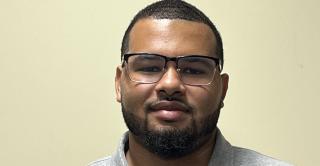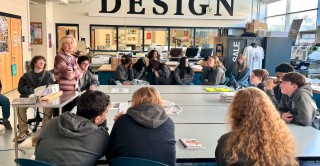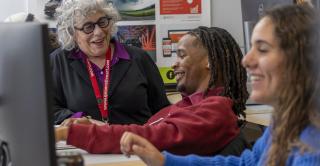
The Form I-20 will be issued to students who have been fully admitted to Central and provided proof of financial support to ISSS Office. Please email the ISSS@ccsu.edu if any information on your Form I-20 is incorrect.
Make sure you have a valid passport, Form I-20, and pay the SEVIS fee.
Pay your SEVIS Fee either by phone, by mail or online, and print a SEVIS fee receipt for your record. The fee must be paid at least three business days before your visa interview.
- Your SEVIS ID number (N00XXXXXXXX) is located in the upper left corner of your Form I-20.
- Central’s SEVIS school code is located in the “School Information” section on page 1 of Form I-20.
- F-2 dependents do not need to pay the SEVIS fee.
- Canadians must pay the SEVIS fee.
If your visa is approved...
you are allowed to enter the United States 30 days before the program start date listed in the “School Information” section of your Form I-20.
If your visa is denied...
please refer to the United States Department of State's Website - Visa Denial. Central Connecticut State University cannot influence visa decisions made by consular officials abroad.
NOTE: All individuals intending to be students at Central must enter the United States in F-1 student status. Entering on a B1/B2 visitor’s visa with the intention of attending school in the United States full-time is ‘unlawful'.
- Form I-20 (issued by Central)
- Admission letter (from Central)
- Original Affidavit of Support
- Valid Passport
- Visa application
- SEVIS fee receipt
- Passport Photo
Book an appointment at the closest United States Embassy to apply for F-1 visa (except Canadians). For more information on visa processing, refer to The US Embassy's site.
Ties to Home Country: Under United States law, all F-1 visa applicants are viewed as intending immigrants. You must therefore be able to show that you have reasons for returning to your home country that are stronger than those for remaining in the United States. “Ties” to your home country include:
- Job
- Family
- Bank accounts, investments, or property ownership
If you are a prospective undergraduate student, the interviewing officer may ask about your:
- Grades
- Educational goals
- Plans for future jobs
- Job opportunities in your home country
- Family or other relationships
- Long-term plans
Keep in mind that each person’s situation is unique. There is no single document, or explanation that can guarantee visa approval.
- Know the Program and How it Fits Your Career Plans: You should be able to explain how studying in the United States will help your career in the future.
- Be Concise: Visa officers often make a decision within the first minute or two, so it is important to make a good first impression. Speak clearly and confidently. Keep your answers short, focused, and to the point.
- Supplemental Documentation: Should be clear and easy for the visa officer to understand at a glance. Avoid long written explanations. Remember, most visa interviews last only 1–3 minutes.
- Not All Countries are Equal: Applicants from countries suffering economic problems or from countries where many students have remained in the United States as immigrants will have more difficulty getting visas. Statistically, applicants from those countries are more likely to be intending immigrants. They are also more likely to be asked questions about job opportunities at home after their study in the United States.
- Employment: Your main purpose of coming to the United States should be to study, not for the chance to work before or after graduation. While many students do work off-campus during their studies, such employment is incidental to their main purpose of completing their education. You must be able to clearly articulate your plan to return home at the end of your program. If your spouse is also applying for an accompanying F-2 visa, be aware that F-2 dependents cannot, under any circumstances, be employed in the United States. If asked, be prepared to address what your spouse intends to do with his or her time while in the United States. Volunteer work and attending school part-time are permitted activities.
- Dependents remaining at Home: If your spouse and children are remaining behind in your country, be prepared to address how they will support themselves in your absence. This can be an especially tricky area if you are the primary source of income for your family. If the consular officer gains the impression that your family members will need you to remit money from the United States in order to support them, your student visa application will almost certainly be denied. If your family does decide to join you at a later time, it is helpful to have them apply at the same embassy where you applied for your visa.
- Maintain a Positive Attitude: Do not engage the consular officer in an argument. If you are denied a student visa, ask the officer for a list of documents he or she would suggest you bring in order to overcome the refusal, and try to get the reason you were denied in writing.



